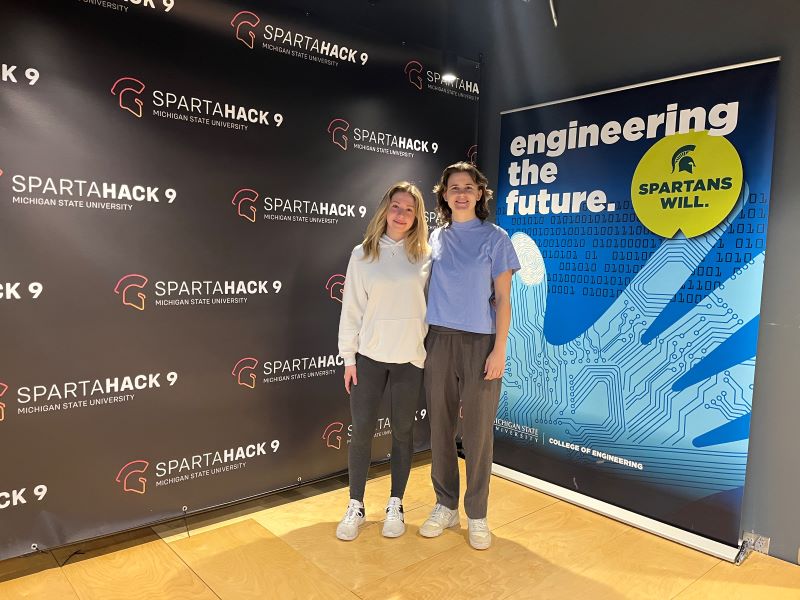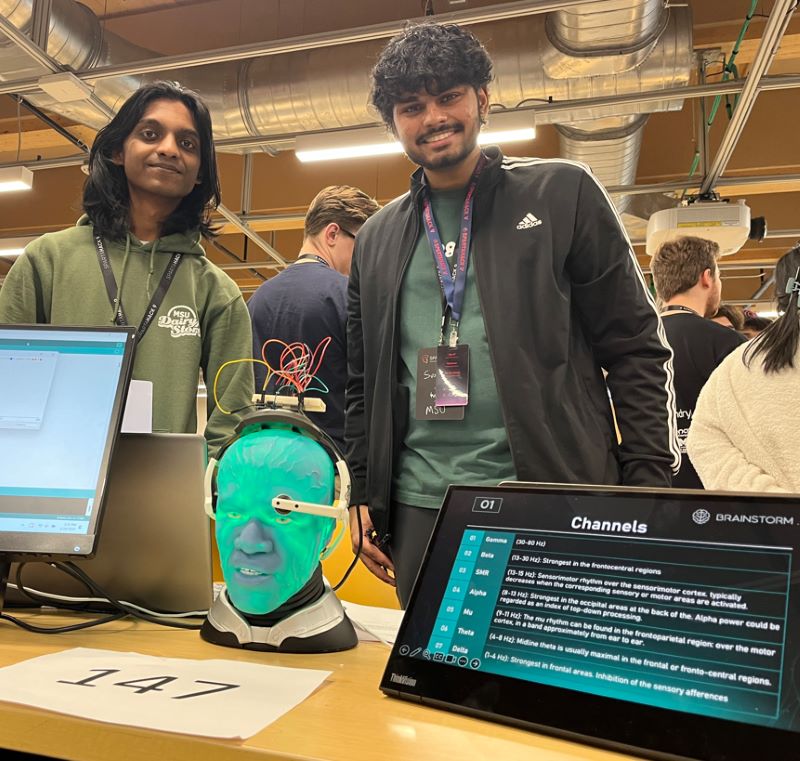Michigan State University’s College of Engineering opened its doors the weekend of Jan. 27-28 for a fun, yet intense event that drew the best out of students passionate about computer science and other constantly evolving fields.
SpartaHack 9 was held inside MSU’s STEM Teaching and Learning Facility and required all 140 participating teams to create a project on campus and have it completed within a 24-hour span.
Projects were judged by a panel of MSU faculty and staff members, along with a group of corporate sponsors. Nearly 30 awards were given out, including a $1,200 for the Best Hack Award.
This wasn’t an event encouraging anyone to break the law, but simply a gathering of like-minded students who enjoying “hacking,” the act of creating something quickly from scratch to solve real-world challenges.
“It’s always surprising to me to see how many people – every year – keep wanting to take on challenges,” said SpartaHack co-director Gabriel Sotelo, a computer science senior. “They sacrificed a weekend, decided to spend 24 hours working and could have been doing something else. At this point, with this event, it’s part of the culture to see computer science students and others with an interest in programing be part of the tradition.”
Similar to previous SpartaHack events on campus, the competition was open to MSU students, others from Michigan universities and colleges, and even those out of state. Some students decided to stay overnight at the STEM Building so they could continue working on their projects; others chose to take breaks and return to work the following morning.
The majority of SpartaHack participants appeared determined to complete their projects under the strict deadline so they could contend for awards. Those who weren’t able to complete their projects were still grateful for the opportunity to learn from their peers and get a jumpstart on work they plan to continue.
MSU computer science students Amelia Marine and Lauren Turpin signed up for SpartaHack two days before the event started. They began the first phase of a project to create a mobile app for students to find group chats for specific classes.
The experience paid off and inspired them to stay curious and pursue the next phase of their app.
“I walked in here with no idea what to expect,” Marine said of the event. “But I loved it. The environment was great, with people walking around, talking to us about our project. Mentors came around and helped us. We got to learn some new skills and created a good base to continue moving forward.”
This year’s SpartaHack featured visual, interactive and engaging projects focused on six tracks of exploration:
- Developer tools – Enhance efficiency, accuracy and productivity of developers
-
Sustainability – Help community or society find solutions for environment and health
-
Financial Services Technology – Create ways to develop financial services & products to consumers
-
Niche/Exploratory – Execute a plan or project that doesn’t quite fit a category but solves a problem
-
Interactive media – Projects that encourage hackers to dive into the world of interactive technology
-
Comedy – Light-hearted projects that are simply fun or hilarious and have entertainment value
-
Embracing the comedy track, MSU students Ashton Kushner, Raduan Moustafhim and Caden McDonald created a computer game called Sparty Party.
The game allows participants to earn points and buy virtual MSU-themed prizes. Users can purchase a variety of “items” including the MSU football team and even Zeke the Wonderdog, a Spartan fan favorite.
McDonald said he was inspired by seeing so many like-minded students sacrifice their weekend, and hours of sleep, to perfect their projects.
“This is probably the most I’ve ever learned about coding,” McDonald said while demonstrating how the game works.
SpartaHack was the type of event that made students think of affordable ways to excel and get an edge on the competition.
MSU students Sushil Srinatha and Cedric Emmanuel drew a lot of attention during SpartaHack’s final day for their completed project called Brainstorm.
Emmanuel used a thrift store find – a replica head of Electro, actor Jamie Foxx’s character in a Spider-Man movie – to give their project some eye-catching appeal.
Emmanuel and Srinatha created a computer-based system with a headset that monitors brain activity. They believe the project has potential to chart how well a person does performing various tasks and gauge how the body reacts to stress under different scenarios.
“Most people have brain, right?” Emmanuel said laughing. “I feel like this is just the next step in studying it. This prototype only cost $40 to make. Imagine what we can do with a bigger budget.”
SpartaHack’s winner of its “Best Hack Award” was a group of MSU students with a project called Fed Up. They created a federated or collaborative learning system that doesn’t require an exchange of data from client devices to global servers. Their model increases data privacy and supports the use of raw data on devices used to train models locally.
For more information about SpartaHack, visit its website and check out the media coverage from WILX-TV News 10 and The State News.
Written by Eric Lacy, lacyeric@msu.edu. See more at the Engineering Media and Public Relations page.

